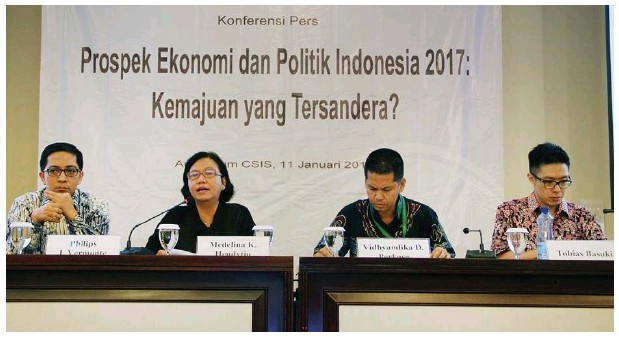Popular Reads
Top Results
Can't find what you're looking for?
View all search resultsPopular Reads
Top Results
Can't find what you're looking for?
View all search resultsPrivate investment key to stoke domestic growth
Private investment is expected to play a role in triggering the country’s economic growth, as global uncertainty still poses weak demand for trade and government spending remains limited.
Change text size
Gift Premium Articles
to Anyone
 Hot issues: Centre for Strategic and International Studies (CSIS) executive director Philips J. Vermonte (left to right), deputy executive director Medelina K. Hendytio, politics and international relations department head Vidhyandika Djati Perkasa and politics and international relations department researcher Tobias Basuki share their insights during a conference titled “Indonesia’s Economic and Politics’ Prospects 2017” in Jakarta on Wednesday. (Courtesy of CSIS/File)
Hot issues: Centre for Strategic and International Studies (CSIS) executive director Philips J. Vermonte (left to right), deputy executive director Medelina K. Hendytio, politics and international relations department head Vidhyandika Djati Perkasa and politics and international relations department researcher Tobias Basuki share their insights during a conference titled “Indonesia’s Economic and Politics’ Prospects 2017” in Jakarta on Wednesday. (Courtesy of CSIS/File)
Private investment is expected to play a role in triggering the country’s economic growth, as global uncertainty still poses weak demand for trade and government spending remains limited.
Experts say private sector and foreign direct investment should play a bigger role to help achieve this year’s economic growth target, which the government has set at 5.1 percent.
“The government has become more realistic with its target and I think economic growth of around 5.1 to 5.3 percent can be achieved. However, I think the role of the private sector should be bigger,” Centre for Strategic and International Studies (CSIS) economics department head Yose Rizal Damuri said in a press conference on Wednesday.
Up until now, household consumption remains the largest growth driver and contributes to more than half of the country’s economy.
(Read also: Indonesia optimistic about 2017 prospects, eyes Rp 678 trillion in investment)
Private investment could be the second-largest engine of growth this year, but the government should work hard to maintain a favorable climate for investors and businesses, including by managing political tensions, according to the CSIS.
A rising political climate is among concerns businesspeople have expressed over the past few months, with business groups calling on the government to ensure stability.
“Social and political aspects are very critical and should be managed well, or else there is risk of disaster. The government should act firmly,” Rizal said.
The government is also expected to continue fighting issues related to corruption and illegal levies that have discouraged high-quality investors from investing.
With global uncertainty and weak demand from several destination countries, the CSIS predicts non-oil and gas exports to grow 3.2 percent this year, lower than the government’s target of 5.6 percent, which would have brought export value up to US$136.2 billion.
The government’s own target is a downward revision from a previous estimate of 11.9 percent.
The country could increase its exports by 3.2 percent this year, although the country would actually be able to get to between 4 and 5 percent if there were no protectionist measures from the United States and the United Kingdom post-Brexit, the CSIS estimates.
Meanwhile, in its latest report titled Global Economic Prospect published on Tuesday, the World Bank also highlights the importance of private investment.
“In Indonesia, growth is expected to accelerate from 5.1 percent in 2016 to 5.4 percent on average in 2017 and 2019, helped by a pickup in private investment,” it wrote.
It maintains its projection for Indonesia’s gross domestic product (GDP) growth at 5.3 percent this year and 5.5 percent in both 2018 and 2019.
According to the report, since 2015, investment growth has begun to recover in the East Asia and Pacific region (EAP), with the exception of China.
“This has reflected a number of developments: stabilizing commodity prices; more accommodative policies amid low inflation and benign global financial conditions; and buoyant foreign direct investment inflows.”
The World Bank lauds Indonesia — the largest commodity exporting country in the EAP region — for its ability to adjust rapidly to lower commodity prices, which have plagued global trade.
With accommodative monetary policy, the country is considered to be successful enough in lifting domestic demand, which contributed to an expected modest rise in GDP growth to 5.1 percent in 2016.
However, barriers in services trade remain in many countries in East Asia and the Pacific, including Indonesia.
Several restrictions on foreign control and ownership, discretionary licensing and limits on the operation of foreign companies are seen as having significant negative impacts on the delivery of services across borders.









